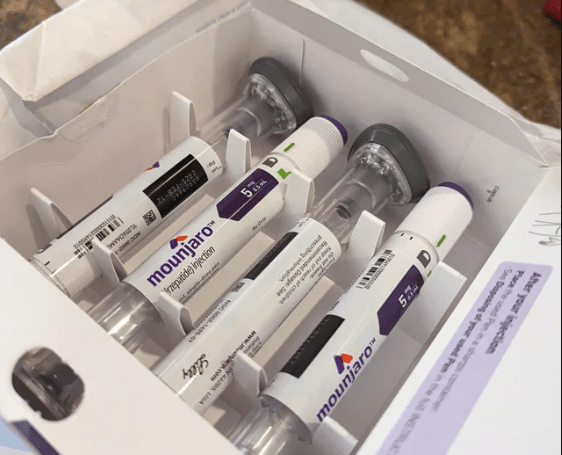Father’s stark warning as weight returns after stopping £270-a-month weight loss jab Mounjaro
A dad-of-two who lost four stone using the popular weight loss jab Mounjaro has spoken out about the harsh reality of regaining weight once the costly treatment stops, sparking fresh concerns about long-term reliance on these so-called miracle jabs.
Darren Ratcliffe, 47, from Greater Manchester, was once tipping the scales at 22-and-a-half stone. After starting a subscription for Mounjaro, priced at a hefty £270 a month, the pounds began to fall off.
In just six months, he dropped four stone. But as soon as the cost became too much, the weight began creeping back.
“Think about Mounjaro like getting a mushroom or a star on Mario Kart – it works really well, and then once you stop, you’re back to normal, no superpowers,” he warned.
Darren isn’t alone. He’s one of the estimated 1.5 million people across the UK currently taking weight loss injections like Wegovy or Mounjaro, many of whom are paying out of pocket. These drugs have surged in popularity following their licensing and partial rollout on the NHS.
“People shouldn’t just come off it and expect life to have been changed, because it hasn’t,” he added.
For Darren, the experience wasn’t new. A decade earlier, he had successfully shed around 10 stone through a structured Weight Watchers programme, only to regain it over time. As he got older, he said losing weight became tougher. Mounjaro felt like an “easy fix.”
Initially starting on a £99-a-month low dose, he eventually upped it to the maximum 15mg weekly dose — the one costing £270. And it worked, until he couldn’t afford it anymore.
“It was great, I lost weight quickly,” Darren said. “Food noise is a big thing for me, and it just went away.
I was wanting a little for breakfast, then getting to 1pm and like ‘I don’t think I want anything, I’ll just pick out a bit of fruit, and then you have a decent evening meal.”
But as soon as he came off it, things changed fast. “I then put back on about 25 per cent of that weight again fairly quickly because nothing was blocking out the food noise anymore… Coming off the jab was like ‘I remember what this feels like, and I don’t like it’.”
He’s now working hard to manage his weight the traditional way, with clean eating, exercise, and no alcohol. His weight currently sits at 18-and-a-half stone, and he’s aiming for 16 stone.
“People need to know that they [weight-loss jabs] are a quick fix… It’s not going to change them long-term,” Darren said.
“If they choose to take it, they need to start preparing for the point they stop by fixing old habits… because you can’t take it forever. And the scary thing is, some people feel trapped in them.”
His story echoes growing concerns from the National Institute for Health and Care Excellence (NICE), which this week warned that many people tend to regain weight once the treatment stops, especially if they don’t have the right support in place.
NICE is now recommending that patients coming off weight loss jabs on the NHS should receive structured check-ins and support for at least 12 months post-treatment. However, this safety net won’t extend to private patients like Darren.
Under current guidance, around 240,000 individuals deemed to have the “greatest need” will be eligible for Mounjaro prescriptions via NHS GPs over the next three years. These will be limited to those who are severely obese and have additional health complications.
Mounjaro works, but only as long as it lasts. Without long-term behavioural change and support, the weight can and often does return.






